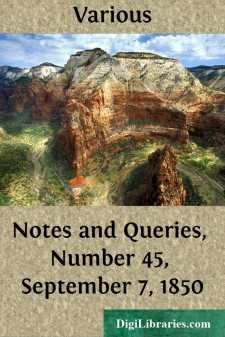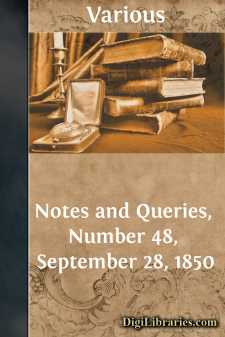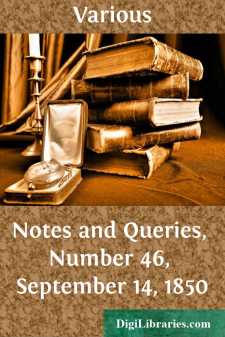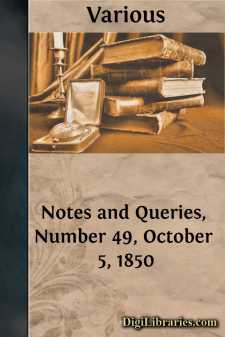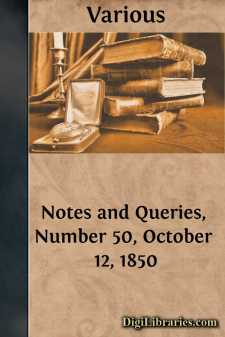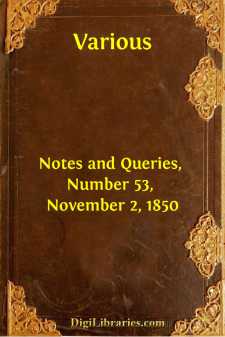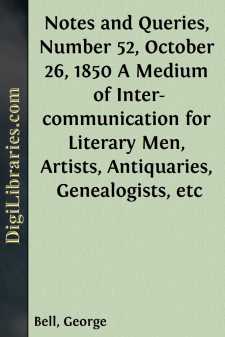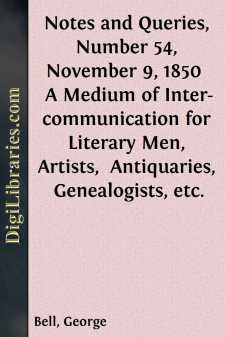Periodicals
- Art 27
- Children's periodicals 59
- Entertainment 5
- Food/Wine 2
- Games/Humor 455
- General
- Health 1
- History 53
- House/Home 1
- Regional 62
- Science/Nature 118
- Transportation 10
General Books
Sort by:
by:
Various
NOTES GRAVESEND BOATS. While so much has been said of coaches, in the early numbers of "Notes and Queries" and elsewhere, very little notice has been taken of another mode of conveyance which has now become very important. I think it may amuse some of your readers to compare a modern Gravesend boat and passage with the account given by Daniel Defoe, in the year 1724: and as it is contained in...
more...
by:
Various
NOTES. FOLK LORE. The First Mole in Cornwall; a Morality from the Stowe of Morwenna, in the Rocky Land.—A lonely life for the dark and silent mole! She glides along her narrow vaults, unconscious of the glad and glorious scenes of earth, and air, and sea! She was born, as it were, in a grave, and in one long living sepulchre she dwells and dies! Is not existence to her a kind of doom? Wherefore is...
more...
by:
Various
NOTES. RIOTS OF LONDON. Seventy years having passed away since the riots of London, there cannot be many living who remember them, and still fewer who were personally in contact with the tumultuous throng. Under such circumstances, I venture to offer for introduction into your useful and entertaining miscellany some incidents connected with that event in which I was either personally an actor or...
more...
by:
Various
NOTES. THE MEANING OF "DRINK UP EISELL" IN HAMLET. Few passages have been more discussed than this wild challenge of Hamlet to Laertes at the grave of Ophelia: "Ham. I lov'd Ophelia! forty thousand brothers Could not, with all their quantity of love, Make up my sum. What wilt thou do for her? —Zounds! show me what thou'lt do? Woo't weep? Woo't fight? Woo't fast?...
more...
by:
Various
NOTES. STRAY NOTES ON CUNNINGHAM'S LONDON. The following notes are so trivial, that I should have scrupled to send them on any other ground than that so well-conceived and labouriously-executed a work should have its most minute and unimportant details as correct as possible. This, in such a work, can only be effected by each reader pointing out the circumstances that he has reason to believe are...
more...
by:
Various
NOTES. A NOTE ON "SMALL WORDS." "And ten small words creep on in one dull line." Most ingenious! most felicitous! but let no man despise little words, despite of the little man of Twickenham. He himself knew better, but there was no resisting the temptation of such a line as that. Small words he says, in plain prosaic criticism, are generally "stiff and languishing, but they may be...
more...
by:
Various
NOTES. OLD SONGS. I heard, "in other days," a father singing a comic old song to one of his children, who was sitting on his knee. This was in Yorkshire: and yet it could hardly be a Yorkshire song, as the scene was laid in another county. It commenced with— "Randle O'Shay has sold his mare For nineteen groats at Warrin'ton fair," and goes on to show how the simpleton was...
more...
by:
Various
NOTES SHAKSPEARE AND MARLOWE. A special use of, a use, indeed, that gives a special value to your publication, is the communication through its means of facts and conclusions for the information or assistance of editors or intending editors. I do not suppose that any gentleman occupying this position would be guilty of so much disrespect to the many eminent names which have already appeared in your...
more...
by:
George Bell
ADDRESS TO OUR FRIENDS. We this day publish our fifty-second Number. Every Saturday, for twelve months, have we presented to our subscribers our weekly budget of "Notes," "Queries," and "Replies;" and in so doing, we trust, we have accomplished some important ends. We have both amused and instructed the general reader; we have stored up much curious knowledge for the use of...
more...
by:
George Bell
ENGLISH AND NORMAN SONGS OF THE FOURTEENTH CENTURY. In a vellum book, known as The Red Book of Ossory, and preserved in the archives of that see, is contained a collection of Latin religious poetry, written in a good bold hand of the 14th century; prefixed to several of the hymns, in a contemporary and identical hand, are sometimes one sometimes more lines of a song in old English or Norman French,...
more...



